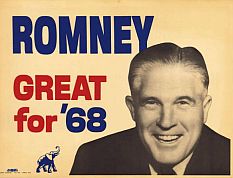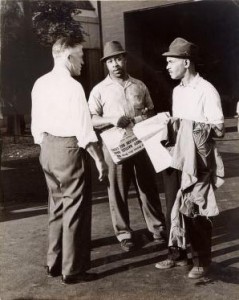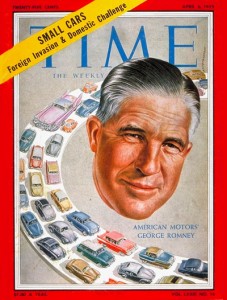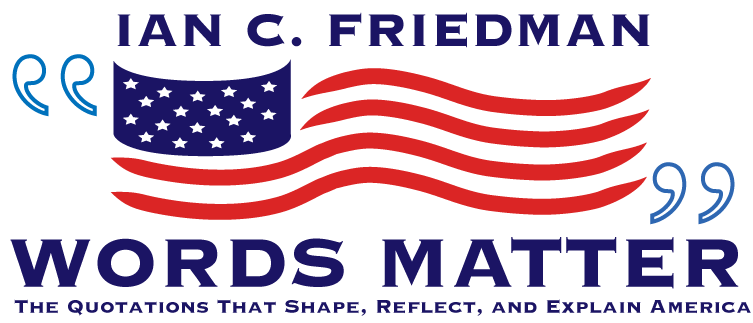“…I had the greatest brainwashing anybody [could] get…” – George Romney, August 31, 1967
Mitt Romney’s father, George Romney, lived an extraordinary American life. Born in Mexico in 1907—the grandson of a Mormon who fled the anti-polygamy laws in the United States during the 1880s—he spent a humble childhood in Texas, Idaho, and Utah before improbably rising to become the successful CEO of an automobile company.
 Romney then turned his attention to politics, winning the governorship as a Republican in the traditionally Democratic state of Michigan three consecutive times. He was a frontrunner for the 1968 GOP presidential nomination when he uttered a quote explaining his opposition to American involvement in the Vietnam War that famously undid his fledgling campaign. But placing this quote in context redeems George Romney and contrasting his words with the Campaign 2012 words of Mitt Romney is illuminating. And the light it casts is not kind to the son.
Romney then turned his attention to politics, winning the governorship as a Republican in the traditionally Democratic state of Michigan three consecutive times. He was a frontrunner for the 1968 GOP presidential nomination when he uttered a quote explaining his opposition to American involvement in the Vietnam War that famously undid his fledgling campaign. But placing this quote in context redeems George Romney and contrasting his words with the Campaign 2012 words of Mitt Romney is illuminating. And the light it casts is not kind to the son.
The quote that left an adhesive mark on George Romney’s legacy was spoken during a televised interview with a Detroit news reporter on August 31, 1967. Romney, who was known for his candor and occasional verbal meandering, clearly and confidently stated that his position on Vietnam had changed because he had come to realize that, “When I came back from Vietnam in 1965, I just had the greatest brainwashing anybody [could] get…”
In a recent article in Rolling Stone, historian Rick Pearlstein explained that after Romney’s famous comment, “he continued with a devastating, prophetic, and one-thousand-percent-correct assessment: that staying in Vietnam would be a disaster. [But people only heard] the word ‘brainwashing’ – not in the colloquial sense in which Romney obviously intended it, but as something literal. Here was this weird dude accusing our generals and diplomats of Svengali-like mind control. The mockery was swift and furious…Romney’s [poll numbers] nose-dived…”
Pearlstein asserts that what Mitt Romney learned from this defining moment in his father’s political life was that “authenticity kills.” That helps explain why Mitt’s words reflect any absence of real conviction on many issues. This often cynical emptiness is especially stark when comparing quotations from each Romney in the areas of civil rights and economic fairness.
 On the critical civil rights issues of their day, George Romney exemplified a profile in courage compared to Mitt Romney’s transparent contortions. In 1963, George Romney welcomed a march in Detroit organized by Martin Luther King and in 1964 he refused to endorse Republican Barry Goldwater’s presidential bid because of Goldwater’s anti-civil rights views. Also in 1963, Romney led a march in the tony Detroit suburb of Grosse Pointe to highlight the problem of housing discrimination against blacks, saying, “Until we eliminate inequality our words will have a hollow sound to the people of the world.”
On the critical civil rights issues of their day, George Romney exemplified a profile in courage compared to Mitt Romney’s transparent contortions. In 1963, George Romney welcomed a march in Detroit organized by Martin Luther King and in 1964 he refused to endorse Republican Barry Goldwater’s presidential bid because of Goldwater’s anti-civil rights views. Also in 1963, Romney led a march in the tony Detroit suburb of Grosse Pointe to highlight the problem of housing discrimination against blacks, saying, “Until we eliminate inequality our words will have a hollow sound to the people of the world.”
Regarding today’s leading civil rights issue, gay marriage, Mitt Romney offers capitulation to his right flank. Though he touted his support of gay rights when running for the U.S. Senate in Massachusetts in 1994, as governor of the state in 2004, Romney was firmly against the state’s law permitting gay marriage, stating, “Massachusetts should not become the Las Vegas of same-sex marriage. We do not intend to export our marriage confusion to the entire nation.” Romney’s rightward drift has continued and he now supports a constitutional amendment banning gay marriage.
Another profound contrast between George and Mitt Romney is evident in their quotes about economic fairness. George Romney described the frequently-lauded concept of ‘rugged individualism’ as, “nothing but a political banner to cover up greed.” His son, however, characterizes any critique of capitalism as, “the politics of envy.” George Romney released twelve years of personal tax returns when he ran for president in 1968. Mitt Romney smugly quipped, “Maybe” when asked if he would follow his father’s example and only after he was dragged kicking and whining did he release just the last two years of his tax returns.
 It is also interesting to speculate what George Romney, who died in 1995, would think of the growing income disparity in the United States. In his 2008 book, The Tyranny of Dead Ideas, Fortune Magazine writer Matt Miller noted that in 1960 when he was the CEO of the American Motors Corporation, “[George Romney] refused a $100,000 bonus because he believed that no executive needed to make more than $225,000 in annual salary (about 1.5 million in today’s dollars).” Can you imagine Mitt Romney—the man who in a span of just a few weeks gave us insight to his view of wealth with the quotes “$10,000 bet?!”, “I think it’s fine to talk about [income inequality] in quiet rooms,” and “I get speaker’s fees ($374,327), but not very much”—taking such a bold and principled action?
It is also interesting to speculate what George Romney, who died in 1995, would think of the growing income disparity in the United States. In his 2008 book, The Tyranny of Dead Ideas, Fortune Magazine writer Matt Miller noted that in 1960 when he was the CEO of the American Motors Corporation, “[George Romney] refused a $100,000 bonus because he believed that no executive needed to make more than $225,000 in annual salary (about 1.5 million in today’s dollars).” Can you imagine Mitt Romney—the man who in a span of just a few weeks gave us insight to his view of wealth with the quotes “$10,000 bet?!”, “I think it’s fine to talk about [income inequality] in quiet rooms,” and “I get speaker’s fees ($374,327), but not very much”—taking such a bold and principled action?
Instead of the misunderstood ‘brainwashing’ quote, it would be useful to recall something else George Romney said. While serving as President Richard Nixon’s first secretary of Housing and Urban Development, Romney became frustrated by Nixon’s duplicity and ultimate lack of support for initiatives he favored. Confiding in a friend with words that decades later could accurately be applied to his own son, Romney said, “I don’t know what [he] believes in. Maybe he doesn’t believe in anything.”
(photos: top, from the Pop History Dig, middle, University of Michigan Bentley Historical Library, bottom, Time Magazine.)




